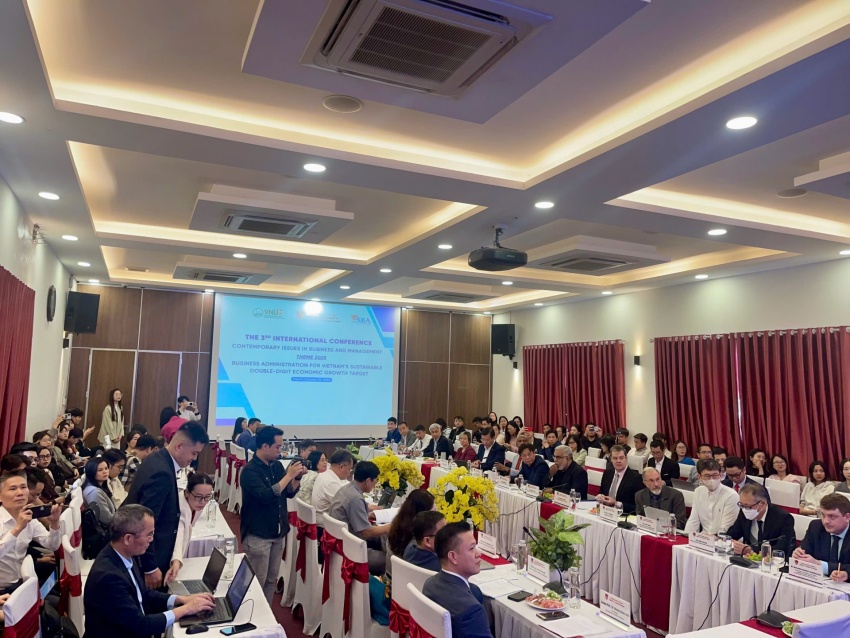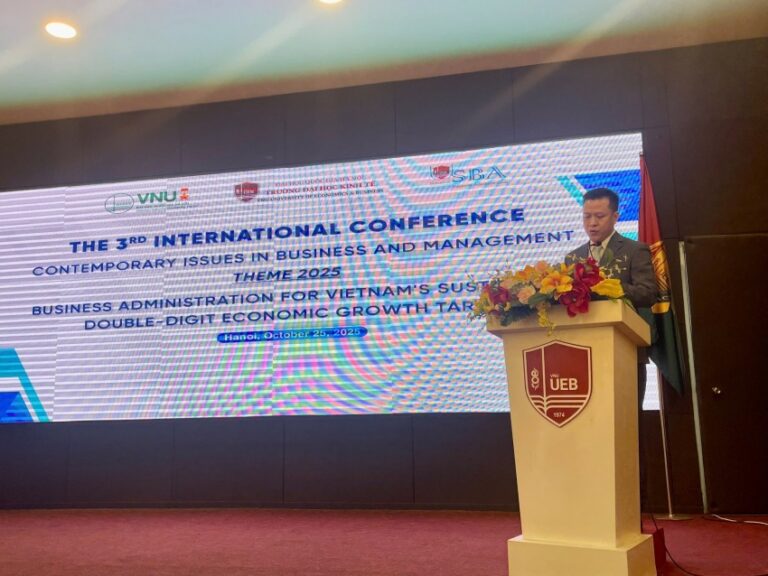At the third international conference on ‘Contemporary Issues in Business and Management’, held on October 25 by the University of Economics and Business (UEB) under the Vietnam National University, Hanoi, experts from Vietnam and abroad discussed how academic institutions can contribute to sustainable double-digit economic growth. The event brought together more than 100 experts, scholars, policymakers, and business leaders to exchange insights on the role of education and innovation in national development.
| Hoang Khac Lich, vice rector of the UEB |
Hoang Khac Lich, vice rector of UEB, explained that achieving the Politburo’s four-pillar development goals requires joint efforts from domestic and international experts to build a modern and innovative business management system. Such reform, he said, is vital for sustaining growth and helping Vietnam escape the middle-income trap.
“In this context, comprehensive innovation in business management is no longer a choice but a prerequisite. This is not a slogan; it is a matter of survival,” Lich said.
Gary L. Frankwick from the University of Texas at El Paso highlighted that sustainable growth cannot rely solely on exports or infrastructure, it must be rooted in the intellectual and institutional foundations that academia provides.
“Universities are not just places of learning, they are also national knowledge centres, where business management is taught with a clear vision and purpose, capable of turning double-digit growth into reality,” said Frankwick.
Vietnam is moving from a production economy towards a technology-driven one, requiring a skilled, creative, and sustainability-oriented workforce. As a result, universities must train future leaders who can integrate business goals with sustainable development; adjust curricula in line with national strategies and real economic demands; and become regional development hubs-linking government, business, and local communities.
This means, according to Frankwick, MBA, management, and economics courses should reflect global trends, digital transformation, and local specificities. Students must be taught responsible leadership, balancing profit with social and environmental impact.
Universities play a key role in linking education with practice through internships, joint research, and business advisory boards that connect learning with real-world needs. These collaborations provide students with practical experience, offer enterprises access to new ideas, and support the development of an academic–economic ecosystem that contributes to national growth.
“Universities should not just grant degrees, they should nurture startups. Business education must teach students to take risks, be creative, and fail intelligently,” said Frankwick, “We must teach students how to fail, and how to stand up again.”
This mindset builds resilience, entrepreneurial spirit, and intellectual stamina, vital for a dynamic economy like Vietnam’s.
Frankwick cautioned that growth built on unsustainable foundations cannot endure. Business education, he said, should embed principles of climate adaptation, the circular economy, and inclusive, green development. Academia must also nurture a mindset of ‘business for the future’, shifting focus from short-term gains to long-term resilience.
 |
Bradley A. Corbertt from Canada’s Ivey School of Business compared the economy to an engine, where government, business, and academia act as three pistons operating together. Without the academic piston, he argued, the engine cannot generate enough power to achieve explosive double-digit growth.
“Academia is the source of intellectual energy that keeps the economic engine running efficiently, ensuring long-term momentum and avoiding overheated, unsustainable growth,” Corbertt noted.
As businesses and governments face the need for rapid decision-making, academia provides strategic thinking and empirical evidence. Universities and research institutes can analyse theories, global trends, and models to propose evidence-based policies tailored to Vietnam’s context.
Such ‘evidence-based policymaking’ reduces the risk of misjudgment and improves economic governance efficiency. Ministries, universities, and enterprises can jointly forecast labour and technology needs, thereby designing training activities aligned with economic development realities.
Universities shape the quality and structure of the workforce by continuously updating curricula in response to market needs and new industrial directions (such as semiconductors, AI, and green energy). They can expand short-term, reskilling, and postgraduate courses to help workers adapt quickly to economic and technological transitions, while partnering with businesses in practical training, so students can work effectively immediately after graduation.
Through innovation centres, incubators, and research parks, universities can support small and medium-sized enterprises and startups, turning ideas into marketable realities and enabling technology transfer. By spreading knowledge in areas such as the circular economy, green management, and digital transformation, academia helps Vietnamese businesses stay aligned with global trends.
“A prime example is the National Innovation Centre, a model of trilateral collaboration among the state, businesses, and universities,” said Corbertt. He suggested that major universities in Hanoi and Ho Chi Minh City, as well as regional institutions, should evolve into local knowledge hubs that drive development in their surrounding areas.
“When every region has its own ‘intellectual engine,’ Vietnam’s economy will grow more evenly and sustainably,” he added.
Universities, he noted, possess the agility to experiment, innovate, and adapt faster than administrative bodies, making them ideal environments for research and entrepreneurship. At the same time, academia plays a moral and cultural role, safeguarding values and ethics that ensure the economy grows not only in scale but also in quality, identity, and sustainability amid globalisation.
Corbett urged Vietnam to deepen collaboration among government, business, and academia through joint policymaking, training, and technology transfer; encourage research-based corporate management; connect universities with industrial zones; and invest in lifelong learning to keep the workforce adaptable.
At the conference, six parallel sessions explored key themes including corporate strategy amid digital transformation, technology applications in management, marketing and communications, sustainable human resource development, labour in globalisation, and practical approaches to business management.
Together, these discussions underscored a unified direction for Vietnam – leveraging knowledge, innovation, and modern management to power long-term, sustainable growth.
Images are for reference only.Images and contents gathered automatic from google or 3rd party sources.All rights on the images and contents are with their legal original owners.

